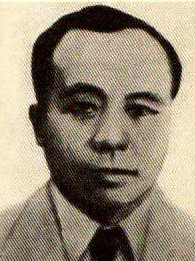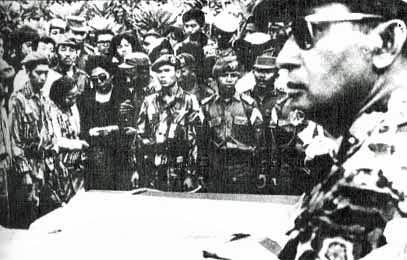|
Warta Bhakti
Warta Bhakti (Indonesian: ''loyal news'') was a short-lived but influential left-wing news publication in Indonesia during the Guided Democracy period, which was a successor to the most read Chinese Indonesian newspaper of the Dutch East Indies, Sin Po. During the height of its popularity in the mid-1960s the paper had the second highest circulation of any newspaper in Indonesia. History During Guided Democracy period ''Warta Bhakti'' was the successor to a previous Indonesian language newspaper, Pantja Warta, which itself had been a renamed version of the long-lasting Chinese Indonesian newspaper Sin Po, founded in 1910. Meanwhile, Sin Po's Chinese language edition ''Xin Bao'' (and all other Chinese language newspapers in Indonesia) had been closed by the government of Indonesia in 1958 after a failed regional rebellion in Sumatra which the government believed to have been supported by Taiwan, and due to widespread anti-Chinese sentiment in Indonesia at that time. The suprema ... [...More Info...] [...Related Items...] OR: [Wikipedia] [Google] [Baidu] |
Indonesian Language
Indonesian ( ) is the official language, official and national language of Indonesia. It is a standard language, standardized variety (linguistics), variety of Malay language, Malay, an Austronesian languages, Austronesian language that has been used as a lingua franca in the multilingual Indonesian archipelago for centuries. Indonesia is the fourth most list of countries by population, populous nation in the world, with over 270 million inhabitants—of which the majority speak Indonesian, which makes it one of the most List of languages by total number of speakers, widely spoken languages in the world.James Neil Sneddon. ''The Indonesian Language: Its History and Role in Modern Society''. UNSW Press, 2004. Most Indonesians, aside from speaking the national language, are fluent in at least one of the more than 700 indigenous languages of Indonesia, local languages; examples include Javanese language, Javanese and Sundanese language, Sundanese, which are commonly used at home a ... [...More Info...] [...Related Items...] OR: [Wikipedia] [Google] [Baidu] |
Harian Indonesia
Harian Indonesia ( zh, 印度尼西亞日报, English: ''Indonesia Daily''), formerly in Chinese as 印尼星洲日报 (English: ''Indonesia - Sin Chew Daily''), is a Chinese-language newspaper published in Indonesia. The paper is the oldest continuously published Chinese-language newspaper in Indonesia. History ''Harian Indonesia'' was first published on September 12, 1966, managed by the ''Yayasan Indonesia Press'' (YIP, Indonesia Press Foundation). In 1967 (the beginning of New Order), there were ban on all of Chinese publications in Indonesia as one of steps to resolving "Chinese Problems". During New Order, ''Harian Indonesia'' was the only Chinese-language newspaper that allowed to publish under the supervision of Indonesia's Ministry of Information. In 2000, the paper took over by a new company PT. Emas Indonesia Duaribu. At the end of 2004, the company was acquired by PT. Abdi Bangsa Tbk. ( Mahaka Media), thus ''Harian Indonesia'' is then under the auspices of Mah ... [...More Info...] [...Related Items...] OR: [Wikipedia] [Google] [Baidu] |
Buru Island
Buru (formerly spelled Boeroe, Boro, or Bouru) is the third largest island within the Maluku Islands of Indonesia. It lies between the Banda Sea to the south and Seram Sea to the north, west of Ambon and Seram islands. The island belongs to Maluku province and includes the Buru and South Buru regencies. Their administrative centers, Namlea and Namrole, respectively, have ports and are the largest towns of the island, served by Namlea Airport and Namrole Airport. About a third of the population is indigenous, mostly Buru, but also Lisela, Ambelau and Kayeli people. The rest of population are immigrants from Java and nearby Maluku Islands. Religious affiliation is evenly split between Christianity and Sunni Islam, with some remnants of traditional beliefs. While local languages and dialects are spoken within individual communities, the national Indonesian language is used among the communities and by the administration. Most of the island is covered with forests rich in tropica ... [...More Info...] [...Related Items...] OR: [Wikipedia] [Google] [Baidu] |
Canada
Canada is a country in North America. Its ten provinces and three territories extend from the Atlantic Ocean to the Pacific Ocean and northward into the Arctic Ocean, covering over , making it the world's second-largest country by total area. Its southern and western border with the United States, stretching , is the world's longest binational land border. Canada's capital is Ottawa, and its three largest metropolitan areas are Toronto, Montreal, and Vancouver. Indigenous peoples have continuously inhabited what is now Canada for thousands of years. Beginning in the 16th century, British and French expeditions explored and later settled along the Atlantic coast. As a consequence of various armed conflicts, France ceded nearly all of its colonies in North America in 1763. In 1867, with the union of three British North American colonies through Confederation, Canada was formed as a federal dominion of four provinces. This began an accretion of provinces an ... [...More Info...] [...Related Items...] OR: [Wikipedia] [Google] [Baidu] |
Ang Jan Goan
Ang Jan Goan ( zh, 洪渊源, , 1894–1984) was an Indonesian Chinese journalist, publisher and political thinker, and director of the influential newspaper ''Sin Po'' from 1925 to 1959. Biography Early life Ang was born on May 25, 1894, in Bandung, Dutch East Indies. His family traced their ancestry to Nan'an, Fujian and his parents, Hong Songmei and Chen Cui Niang, operated a grocery store. He had early education in the Malay language and Hokkien and then enrolled in a Tiong Hoa Hwee Koan school. After finishing at the THHK school he went to China to study at the JNXT (Jinan Xuetang), also known as Kay Lam Hak Tong, a school designed for Overseas Chinese in Nanjing. (The institution is a predecessor of the present day Jinan University.) Ang was still studying there when the 1911 Revolution broke out, forcing him to end his studies and return to the Dutch East Indies. Upon his return to the Indies he became a teacher, first at Ciamis in 1912 and 1913, and then 1917 in Tasi ... [...More Info...] [...Related Items...] OR: [Wikipedia] [Google] [Baidu] |
Omar Dani
Air Chief Marshal (Ret.) Omar Dhani (23 January 1924 – 24 July 2009) was commander of the Indonesian Air Force (TNI-AU) from 1962 until 1965. He was a leading leftist figure in Indonesia during the Sukarno era. Early life and career Dhani first worked on a plantation, then at the government radio station, in the ministry of information, and then in a bank. He enrolled in the Air Force Academy in 1950, and in 1956, attended the Royal Air Force Staff College, Andover in Great Britain. He rose through the ranks to become Minister and Commander of the Air Force in January 1962, succeeded Soerjadi Soerjadarma after the latter was accused of not providing air support during the Battle of Arafura Sea. He was appointed as the commander of the Korps Siaga, later Korps Mandala Siaga (KOLAGA) during the 1963-1965 Indonesia-Malaysia Confrontation, where he commanded three brigades. Imprisonment and eventual release His support for Sukarno, and his apparent support for the 30 Septemb ... [...More Info...] [...Related Items...] OR: [Wikipedia] [Google] [Baidu] |
Indonesian Communist Party
The Communist Party of Indonesia (Indonesian: ''Partai Komunis Indonesia'', PKI) was a communist party in Indonesia during the mid-20th century. It was the largest non-ruling communist party in the world before its violent disbandment in 1965. The party had two million members in the 1955 elections, with 16 percent of the national vote and almost 30 percent of the vote in East Java. During most of the period immediately following independence until the eradication of the PKI in 1965, it was a legal party operating openly in the country. History Forerunners The Indies Social Democratic Association (Dutch: ''Indische Sociaal-Democratische Vereeniging'', ISDV) was founded in 1914 by Dutch socialist Henk Sneevliet and another Indies socialist. The 85-member ISDV was a merger of the two Dutch socialist parties (the SDAP and the Socialist Party of the Netherlands), which would become the Communist Party of the Netherlands with Dutch East Indies leadership. The Dutch members of the ... [...More Info...] [...Related Items...] OR: [Wikipedia] [Google] [Baidu] |
30 September Movement
The Thirtieth of September Movement ( id, Gerakan 30 September, abbreviated as G30S, also known by the acronym Gestapu for ''Gerakan September Tiga Puluh'', Thirtieth of September Movement) was a self-proclaimed organization of Indonesian National Armed Forces members who, in the early hours of 1 October 1965, assassinated six Indonesian Army generals in an abortive ''coup d'état'', resulting in the unofficial but more accurate name of Gestok, for ''Gerakan Satu Oktober'', or First of October Movement. Later that morning, the organisation declared that it was in control of media and communication outlets and had taken President Sukarno under its protection. By the end of the day, the coup attempt had failed in Jakarta. Meanwhile, in central Java there was an attempt to take control over an army division and several cities. By the time this rebellion was put down, two more senior officers were dead. In the days and weeks that followed, the army, socio-political, and religious ... [...More Info...] [...Related Items...] OR: [Wikipedia] [Google] [Baidu] |
Suharto
Suharto (; ; 8 June 1921 – 27 January 2008) was an Indonesian army officer and politician, who served as the second and the longest serving president of Indonesia. Widely regarded as a military dictator by international observers, Suharto led Indonesia through a dictatorship for 31 years, from the fall of Sukarno in 1967 until his own resignation in 1998. The legacy of his 31-year rule, and his US$38 billion net worth, is still debated at home and abroad. Suharto was born in the small village of Kemusuk, in the Godean area near the city of Yogyakarta, during the Dutch colonial era. He grew up in humble circumstances. His Javanese Muslim parents divorced not long after his birth, and he lived with foster parents for much of his childhood. During the Japanese occupation era, Suharto served in the Japanese-organized Indonesian security forces. During Indonesia's independence struggle, he joined the newly formed Indonesian Army. There, Suharto rose to the rank of major g ... [...More Info...] [...Related Items...] OR: [Wikipedia] [Google] [Baidu] |
Transition To The New Order
Indonesia's transition to the New Order in the mid-1960s ousted the country's first president, Sukarno, after 22 years in the position. One of the most tumultuous periods in the country's modern history, it was the commencement of Suharto's 31-year presidency. Described as the great ''dhalang'' ("puppet master"), Sukarno drew power from balancing the opposing and increasingly antagonistic forces of the army and Indonesian Communist Party (PKI). By 1965, the PKI extensively penetrated all levels of government and gained influence at the expense of the army. On 30 September 1965, six of the military's most senior officers were killed in action (generally labelled an "attempted coup") by the so-called 30 September Movement, a group from within the armed forces. Within a few hours, Major General Suharto mobilised forces under his command and took control of Jakarta. Anti-communists, initially following the army's lead, went on a violent purge of communists throughout the coun ... [...More Info...] [...Related Items...] OR: [Wikipedia] [Google] [Baidu] |
Harian Rakjat
(EYD: , 'People's Daily') was an Indonesian newspaper published by the Communist Party of Indonesia (PKI) from 1951-1965. The motto was ('For the people there is only one daily, Harian Rakjat!'). Harian Rakyat was managed by Njoto as a member of the editorial board and Mula Naibaho as editor in chief. History Early history was first published on January 31, 1951, and was originally named ( 'People's Voice'). In its heyday, was the most popular political newspaper ever published in Indonesia, with average circulation of 23,000 copies in the 1950s and 1960s. ''Jurnal Nasional'', Senin, 23 Jul 2007 The newspaper was sold at a retail and subscription price of Rp 0.60 and Rp 14.5 a month, respectively. < ... [...More Info...] [...Related Items...] OR: [Wikipedia] [Google] [Baidu] |






